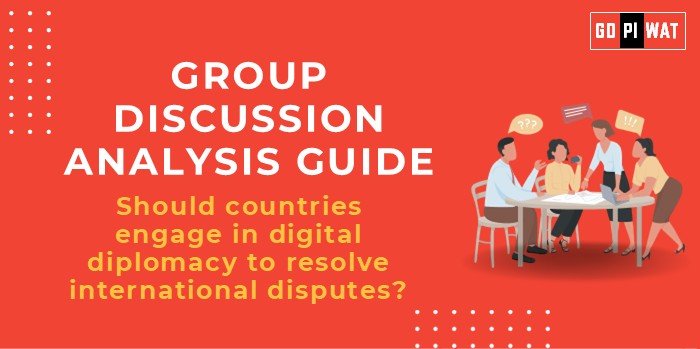📋 Group Discussion Analysis Guide: Should Countries Engage in Digital Diplomacy to Resolve International Disputes?
🌐 Introduction to the Topic
📖 Opening Context
Digital diplomacy, also known as cyber or tech diplomacy, is reshaping international relations, where technology acts as a bridge or battlefield for global issues. With the digital era deepening interconnectivity, countries now leverage online platforms and digital tools to influence policies, mediate disputes, and foster cooperation.
📜 Topic Background
The rise of digital diplomacy traces back to the early 2000s when governments started using online tools to enhance their international presence. Over time, this evolved into using technology to address global conflicts, cybersecurity concerns, and economic partnerships. The increasing use of AI and big data in diplomacy underscores its growing significance.
📊 Quick Facts and Key Statistics
- 🌐 Global Internet Penetration: Over 5.3 billion users in 2024, highlighting the scope of digital diplomacy.
- 🔐 Cybersecurity Threats: Over 2,000 international cyberattacks annually affecting diplomatic relations (UNODC, 2023).
- 💰 Digital Economy Size: $11.5 trillion in 2023, a key domain for diplomatic efforts (World Bank).
- 📜 Cyber Peace Treaties: 13 global treaties addressing cyber warfare and digital disputes exist but remain underutilized.
🤝 Stakeholders and Their Roles
- 🏛️ Governments: Shape cyber policies and engage in digital negotiations.
- 🌐 International Organizations: Mediate and establish norms for cyber peace (e.g., UN, WTO).
- 💻 Tech Giants: Companies like Microsoft and Google provide infrastructure and influence regulatory frameworks.
- 👥 Citizens: Drive global discussions through social media and digital activism.
🏆 Achievements and Challenges
✨ Achievements
- 🌍 Global Coordination: The Paris Call for Trust and Security in Cyberspace has over 80 country participants.
- 🤝 Improved Conflict Mediation: Digital platforms helped facilitate peace talks, like Norway’s role in Colombian negotiations (2022).
- 💡 Economic Agreements: The U.S.-EU Trade and Technology Council promotes tech-based trade diplomacy.
⚠️ Challenges
- 🔐 Cybersecurity Breaches: Cases like the SolarWinds hack undermine trust in digital tools.
- 🌍 Digital Divide: Many developing nations lack infrastructure for effective digital diplomacy.
- 📢 Misinformation: Disinformation campaigns hinder meaningful dialogue.
🌍 Global Comparisons
- ✅ Success in Estonia: Strong e-governance supports robust digital diplomatic ties.
- ⚠️ Challenges in Africa: Limited internet access hinders digital participation in global discussions.
📖 Case Studies
- 🇸🇬 Singapore’s Cybersecurity Initiative: Strengthened regional cyber norms in ASEAN.
- 🇪🇺 EU-GDPR Influence: A benchmark for digital diplomacy’s regulatory aspect.
💡 Structured Arguments for Discussion
- 🛠️ Supporting Stance: “Digital diplomacy can expedite conflict resolution by leveraging real-time communication and AI-driven analytics to mediate disputes effectively.”
- 🛡️ Opposing Stance: “The reliance on digital diplomacy risks data breaches and escalations, especially with uneven technological advancements among nations.”
- ⚖️ Balanced Perspective: “While digital diplomacy offers unprecedented tools for dispute resolution, its effectiveness hinges on robust cybersecurity and equitable access.”
🎯 Effective Discussion Approaches
🔑 Opening Approaches
- 📊 Data-Driven Start: “With cyberattacks costing the global economy $6 trillion annually, digital diplomacy is no longer optional.”
- 🌍 Global Context: “From Estonia to Singapore, digital diplomacy has proven transformative but remains underused in international disputes.”
⚙️ Counter-Argument Handling
- 🔄 Cybersecurity: “Investments in shared cybersecurity frameworks can address data breach concerns.”
- ✅ Digital Divide: “Regional partnerships can build the necessary infrastructure for equitable participation.”
🧠 Strategic Analysis of Strengths and Weaknesses
SWOT Analysis:
- 💪 Strengths: Real-time dialogue, scalable tools, cost-effective conflict resolution.
- 🛠️ Weaknesses: Cybersecurity risks, digital inequality, reliance on private entities.
- 🌟 Opportunities: AI in dispute analytics, global digital treaties, enhanced public diplomacy.
- ⚠️ Threats: Cyberwarfare escalation, geopolitical digital silos, misinformation campaigns.
🏫 Connecting with B-School Applications
📚 Real-World Applications
- 💻 Courses or projects on AI in diplomacy, cybersecurity management, or tech-driven global governance.
🎓 Sample Interview Questions
- ❓ “How can digital diplomacy bridge geopolitical tensions in Asia?”
- ❓ “What role should tech companies play in international diplomacy?”
💡 Insights for Students
- 📈 Research how tech influences international relations.
- 🤝 Explore partnerships between governments and private tech firms in diplomacy.


